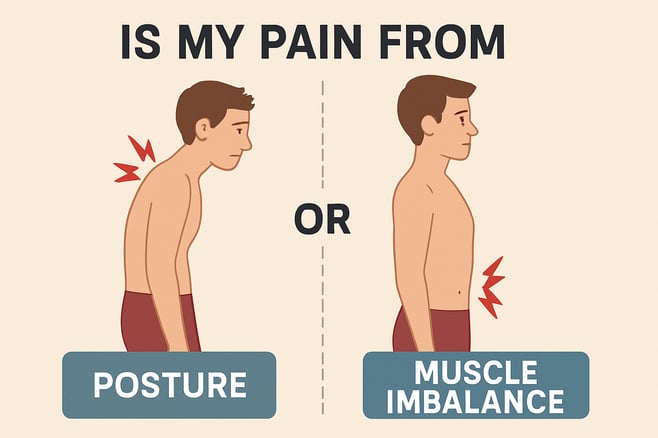Is My Pain From Posture or Muscle Imbalance? A Mississauga Physio Explains
Have you been dealing with nagging aches in your neck, back, or shoulders? You’re not alone. Many people in Erin Mills and across Mississauga experience discomfort from everyday activities, whether it’s hours spent hunched over a laptop, long commutes, or repetitive movements in sports and fitness. But how do you know if your pain is caused by poor posture or a muscle imbalance? Understanding the difference is key to treating your pain effectively and preventing it from coming back
.
At Aurika Wellness, our physiotherapists work with patients to identify the root cause of their pain and create a tailored plan that addresses their specific needs. In this blog, we’ll break down the signs of posture-related versus muscle imbalance pain, and explain how physiotherapy can help you get back to feeling your best.
What Is Posture-Related Pain?
Posture-related pain occurs when your body maintains positions that place repeated stress on muscles, joints, and ligaments over time. Even if you’re generally active, holding your body in less-than-ideal positions can cause pain and discomfort. Common causes include:
- Desk jobs and studying: Hunching over computers or textbooks for hours.
- Phone usage: Forward head posture from looking down at your phone.
- Carrying heavy bags: Overloading one shoulder or unevenly distributing weight.
- Standing improperly: Leaning on one leg or slouching while standing.
- Discomfort that worsens after prolonged sitting or standing.
- Pain that eases when you move, stretch, or change positions.
- Tightness in the shoulders, neck, or lower back.
- Fatigue in muscles that are constantly overworked.
Over time, poor posture can lead to chronic pain, joint dysfunction, and even headaches. While posture is easy to overlook, it plays a crucial role in overall musculoskeletal health.
What Is Muscle Imbalance Pain?
Muscle imbalance occurs when some muscles are stronger or tighter than their opposing muscles. This creates uneven tension and altered movement patterns, which can result in pain and injury. Muscle imbalances can develop from:- Overtraining certain muscles in sports or at the gym.
- Repetitive motions, such as swinging a tennis racquet or typing at a keyboard.
- Previous injuries that caused other muscles to compensate.
- Pain that occurs during specific movements, rather than from just sitting or standing.
- Stiffness or tightness in one area, with weakness in the opposing muscles.
- Difficulty performing activities that were previously easy, such as lifting a bag or climbing stairs.
Muscle imbalances are often subtle but can worsen over time if not addressed. Unlike posture-related pain, which may respond to simple ergonomic adjustments, imbalances require targeted exercises and professional guidance.
How Physiotherapist Can Help
A physiotherapist can perform a thorough assessment to determine whether your pain is posture-related, muscle imbalance-related, or a combination of both. At Aurika Wellness in Erin Mills, this typically includes:- Posture and movement analysis: Observing your alignment during daily activities.
- Strength and flexibility testing: Identifying weak or tight muscles.
- Functional assessments: Checking how your muscles work together during movement.
Based on the assessment, your physiotherapist may recommend:
- Targeted exercises: To strengthen weak muscles and stretch tight ones.
- Manual therapy: Hands-on techniques to relieve tension and improve mobility.
- Ergonomic advice: Adjustments to your workspace, backpack, or daily habits.
- Education: Guidance on proper posture, safe movement, and activity modification.
With consistent physiotherapy, many patients experience significant improvements in pain, posture, and overall function within weeks.
Practical Tips You Can Try at Home
- Take frequent breaks: Stand up and stretch every 30–45 minutes.
- Check your workstation: Make sure your screen is at eye level and your chair supports your lower back.
- Strengthen weak muscles: Focus on exercises for the back, glutes, and core.
- Stretch tight areas: Chest, hamstrings, hip flexors, and shoulders are common tight spots.
- Mind your posture:Keep shoulders relaxed, chin tucked, and spine neutral when sitting or standing.
Even small changes can make a big difference over time, especially when combined with professional guidance.
When to See a Physiotherapist in Erin Mills
You should seek physiotherapy if- Pain persists for more than a few weeks.
- Pain interferes with daily activities, such as work, school, or exercise.
- You notice weakness, stiffness, or imbalance during movement.
A physiotherapist can create a personalized plan to correct posture, address muscle imbalances, and prevent future injuries. At Aurika Wellness, we also provide direct billing with insurance providers, making it easy for students and working adults in Mississauga to access care without upfront costs.
FREQUENTLY ASKED QUESTIONS
How can I tell if my pain is due to posture or muscle imbalance?
A physiotherapist can assess your posture, strength, and movement patterns to determine the cause of your pain. Often, it’s a combination of both.
Can posture correction alone fix muscle imbalances?
Not always. While posture correction helps, targeted strengthening and stretching are usually required to address imbalances effectively.
How long does it take to see improvements?
Many patients notice relief within a few weeks with consistent exercises and physiotherapy. More complex cases may require longer-term care.
Are physiotherapy sessions covered by student insurance in Mississauga?
Yes! Many student insurance plans allow direct billing, so your out-of-pocket costs can be $0 if your benefits cover physiotherapy.
%20-%20Edited.png?width=150&height=103&name=Final%20LOGO@4x%20(2)%20-%20Edited.png)


